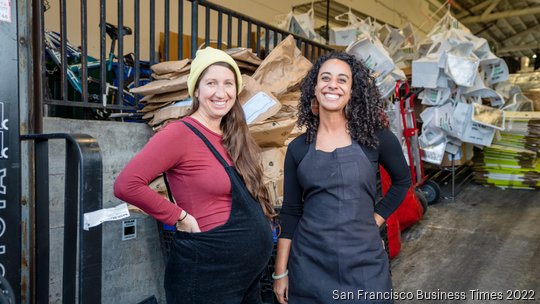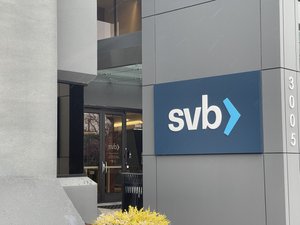
An investor called Lindsey Hoell last week on Thursday morning and asked her where Dispatch Goods was keeping its money.
She didn't know it yet, but a run on SVB was in progress, and SVB's assets would be seized by federal authorities within 24 hours.
Dispatch had recently raised new funding, and the team hadn't yet decided where to park the cash that wasn't needed right away. In the meantime, it was sitting in SVB.
After the investor called, Hoell immediately went to her board to seek advice.
Ultimately, she decided the prudent thing would be to open a new account somewhere else, went to a Wells Fargo branch in-person, deposited $25 from her wallet and opened up a new account for the company. By Thursday afternoon, she was ready to move SVB money into it.
It was too late. A wire transfer initiated at 4 p.m. that afternoon became locked up in a backlog of requests from other companies rushing to pull their money out.
Dispatch Goods helps businesses cut down on single-use packaging by supplying reusable containers, and then recollecting and sanitizing them, creating a closed loop system.
Like other startups, the most pressing issue was how to make payroll that was due in less than a week. Unlike some startups, it doesn't just employ software engineers and other office workers — there's also logistics and warehouse employees who aren't paid the same lofty salaries as many technical workers. They would be the most vulnerable if the company couldn't meet payroll.
There's a "legal, moral, ethical obligation" to pay people on time, Hoell said. And as someone who comes from a working-class background, "I know, personally, what this is to those people. … I'm from Ohio, a child of two school teachers."
The new account would be useless for payroll without enough cash in it, and they would also need a bank that could cut paper checks so employees would be able to cash them immediately, instead of waiting for new routing numbers and transactions to clear.
She drove around on Saturday with her 2-month-old infant and looked for a bank that would let her set up a new checking account and cut checks, to no avail.
Good news came late Sunday evening when authorities announced that all deposits would be guaranteed. It brought relief to SVB's account holders and the financial markets, but it didn't end the saga.
"In the short term, this is turning from a catastrophe into a nuisance," Hoell said. "There's now logistical and tactical things that we have to deal with. It's annoying. But I think there is concern about long-term tech ecosystem challenges that Silicon Valley Bank really filled."
For startups that are at least 3 years old, SVB's collapse is just the latest in a string of crises and difficulties that began with Covid-19 shutdowns in 2020 and has since included a broad downturn for the tech industry.
"The startup ecosystem has been hit in the last year particularly hard anyways. So, adding another insult to this ecosystem, I don't think it's good. No one is excited about that," Hoell said.
One of the lingering questions is who will step in to fill the gap left in SVB's wake?
Hundreds of venture capitalists penned an open letter advocating for founders to return deposits to the bank in the event that officials find a buyer. The bank's newly appointed CEO Tim Mayopoulos has also appealed to former account holders to return.
"The jury's still out for us. We have moved a big chunk of our money to Wells Fargo," Hoell said. "It feels safe there, at least in the short term. So I'm not worried about our money disappearing in the next week or two. So at least, I think it gives us time to do an analysis. I think we will never again be only banking at one bank."
The big banks aren't as used to working with startups, though. In addition to their lack of training around cap tables and ownership stakes in the venture capital industry, they have different rules for wire transfers.
Wells Fargo has a $100,000 limit on outgoing wire transfers, limiting their ability to move cash around, Hoell said.
There could also be a longer-term impact on climate companies and women-led startups.
SVB "had an enormous reputation for funding climate companies. And I think that we're going to feel that loss," Hoell said.
The bank also provided another lifeline that has become increasingly used over the past year as equity capital became more difficult to raise: venture debt.
"Venture debt was a tool that was used, particularly in times where venture capital investment had dips, and it helped really bridge companies. In fact, we were just approved for venture debt through Silicon Valley Bank the week that this happened, and which obviously is not materializing now," Hoell said. "And that does affect women more because we have a harder time attracting venture capital."






